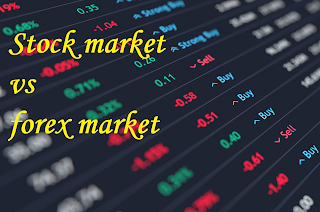Navigating Investment Horizons: Unraveling the Stock Market vs. Forex Market Dilemma
 |
| Comparing the Stock Market and Forex Market: Key Differences and Similarities |
Introduction:
Investors seeking opportunities in the financial markets often find themselves faced with a choice between the stock market and the forex market. Both offer unique advantages and risks, catering to different investment preferences. In this article, we will explore the fundamental differences and similarities between these two major financial markets.
Stock Market Overview:
The stock market, also known as the equity market, is a platform where investors buy and sell shares of publicly listed companies. Investors become partial owners of these companies, and their returns are influenced by the company's performance. Stock markets are centralized exchanges where buyers and sellers are matched through brokers, and transactions are regulated by governing bodies.
Forex Market Overview:
In contrast, the forex (foreign exchange) market is a decentralized global marketplace where currencies are traded. It is the largest and most liquid financial market, allowing participants to buy and sell currencies against each other. Forex trading occurs 24 hours a day, five days a week, as it involves various financial centers worldwide.
Key Differences:
Assets Traded:
- Stock market: Investors trade shares of publicly listed companies.
- Forex market: Traders exchange currencies.
Market Structure:
- Stock market: Centralized exchanges (e.g., NYSE, NASDAQ) facilitate transactions.
- Forex market: Decentralized, with no physical exchange; operates over-the-counter (OTC).
Trading Hours:
- Stock market: Typically open for a specific number of hours on business days.
- Forex market: Operates 24 hours a day, five days a week, due to global time zone differences.
Leverage and Margin:
- Stock market: Generally lower leverage; margin requirements vary.
- Forex market: Higher leverage available; traders can control larger positions with a smaller amount of capital.
Key Similarities:
Risk and Reward:
- Both markets involve risk, and potential returns are influenced by market conditions.
Analysis Techniques:
- Technical and fundamental analysis are applicable to both markets, aiding investors in making informed decisions.
Market Sentiment:
- Traders in both markets closely monitor and react to market sentiment, news, and economic indicators.
Conclusion:
The choice between the stock market and forex market depends on an investor's preferences, risk tolerance, and financial goals. The stock market offers ownership in companies, while the forex market provides opportunities to profit from currency fluctuations. Understanding the distinctions and similarities between these markets is crucial for making informed investment decisions and navigating the complexities of the financial world.
